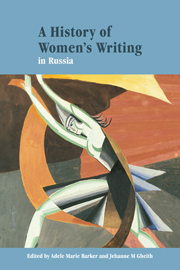Book contents
- Frontmatter
- Contents
- Notes on contributors
- Acknowledgments
- Note on transliteration
- List of abbreviations
- Introduction
- 1 Women's image in Russian medieval literature
- 2 Sappho, Corinna, and Niobe: genres and personae in Russian women's writing, 1760–1820
- 3 The inexperienced muse: Russian women and poetry in the first half of the nineteenth century
- 4 Women of the 1830s and 1850s: alternative periodizations
- 5 “A particle of our soul”: prerevolutionary autobiography by Russian women writers
- 6 The women of Russian Montparnasse (Paris, 1920–1940)
- 7 Women in Russian Symbolism: beyond the algebra of love
- 8 The eastern path of exile: Russian women's writing in China
- 9 Realist prose writers, 1881–1929
- 10 Women and gender in post-symbolist poetry and the Stalin era
- 11 Writing the female body politic (1945–1985)
- 12 In their own words? Soviet women writers and the search for self
- 13 Women's poetry since the sixties
- 14 The persistence of memory: women's prose since the sixties
- 15 Perestroika and post-soviet prose: from dazzle to dispersal
- Bibliographical guide to writers and their works
- Guide to further reading
- Index
8 - The eastern path of exile: Russian women's writing in China
Published online by Cambridge University Press: 22 September 2009
- Frontmatter
- Contents
- Notes on contributors
- Acknowledgments
- Note on transliteration
- List of abbreviations
- Introduction
- 1 Women's image in Russian medieval literature
- 2 Sappho, Corinna, and Niobe: genres and personae in Russian women's writing, 1760–1820
- 3 The inexperienced muse: Russian women and poetry in the first half of the nineteenth century
- 4 Women of the 1830s and 1850s: alternative periodizations
- 5 “A particle of our soul”: prerevolutionary autobiography by Russian women writers
- 6 The women of Russian Montparnasse (Paris, 1920–1940)
- 7 Women in Russian Symbolism: beyond the algebra of love
- 8 The eastern path of exile: Russian women's writing in China
- 9 Realist prose writers, 1881–1929
- 10 Women and gender in post-symbolist poetry and the Stalin era
- 11 Writing the female body politic (1945–1985)
- 12 In their own words? Soviet women writers and the search for self
- 13 Women's poetry since the sixties
- 14 The persistence of memory: women's prose since the sixties
- 15 Perestroika and post-soviet prose: from dazzle to dispersal
- Bibliographical guide to writers and their works
- Guide to further reading
- Index
Summary
No one will hear your voice
in the depth of the night
Whether you cry out or not …
MARIIA VIZI, Noktiurn 2 (Nocturne 2, 1970s)Histories of Russian literature have all too often ignored the Far Eastern emigration. Part of the reason for this neglect lies in the very nature of the emigration itself. Unlike the émigré communities in Paris, Berlin, and New York where in time the Russian community gradually became integrated with the native population, the Russian émigrés in China never assimilated. Essentially they remained outsiders to the country and culture which they inhabited, living an entirely Russian life with rare instances of understanding or assimilating Chinese culture. Apart from specialists and interpreters, ordinary Russians did not learn Chinese the way émigrés learned French, Czech, or Serbo-Croatian or the other languages of Europe. Estranged from Chinese life, the émigré population was similarly cut off from émigré life in Europe. Distance and political upheavals prevented many of their literary journals and newspapers from finding their way to the West. Thus it was that the Russians living in China from 1917 through the post World War II years found themselves torn not only from the country they had left but from the European émigré communities as well, a fact which may account for why so little critical attention has until recently been paid to this chapter in Russian literary history.
- Type
- Chapter
- Information
- A History of Women's Writing in Russia , pp. 153 - 174Publisher: Cambridge University PressPrint publication year: 2002



